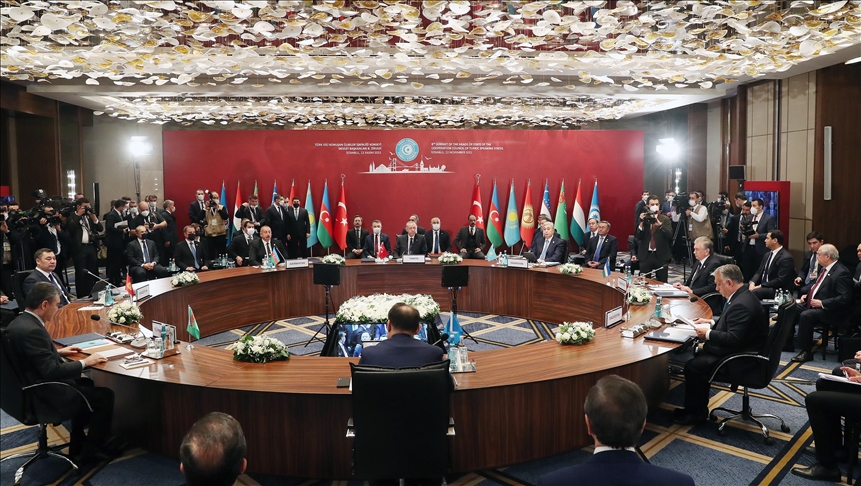Siamak Kakaei in an interview with the site of Strategic Council on Foreign Relations pointed out that during the Turkish States Summit held on November 12, 2021 containing Hungary, Turkey, Republic of Azerbaijan, Kyrgyzstan, Kazakhstan, Uzbekistan and also Turkmenistan (as observer member) the name of the organization changed from Turkish Council to Organization of Turkish States which indicates a serious and substantive change in the structural philosophy and organization of the entity. Concerning the reason why new concepts were applied in the course of the meeting, he commented:” the concepts like renaming states instead of countries attracted the attentions and raised the question that why the word States was used? There is a possibility that Turkey has taken as loan the wording from applied word between her and Republic of Azerbaijan under two states one nation”.
He continued:” If this is the case, then Turkey and other Turkish speaking countries meant by using the concept of nation for all these countries as a subtle measure aimed at using states at a nation scale which means Turkish states within the framework of Turkish nation”.
Kakaei emphasized:” If we pay attention to this definition then Turkey has included the element of trans-national identity seeking as the axis and the focal point of a part of her new foreign policy in Caucasus and Central Asia regions”.
He explained about the results of such measures by Turkey:” in such a situation, fostering the concept of Turkish nation in the geography that form the Turkish states, can cover other regions too. Perhaps, Turkey stands up to support Turkish speakers or the nationality of Turks in other countries on another occasion”.
Answering to the distinction between Istanbul meeting with previous meetings of Turkish Council, the expert on Turkey affairs said:” in this context the invitation extended to Hungary to attend in the community of Turkish speaking countries is contemplative too”.
Concerning the outcomes of such a meeting at aforementioned scales, Kakaei said:” the important outcome of such measures is to provoke ethnic emotions in countries where there are Turk-Azeri ethnicities and this can be a pretext for Turkey’s effort aimed at cultural infiltration or provocative measures. This, by itself, is also considered as a threat to the regional countries that have a Turkish population”.
According to the expert, more willingness of Turkey to foster the concepts like Turkish World or Turkish States and the Council of Turkish Speaking States is considered to be an effort to strengthen trans-national identity seeking in foreign policy of Ankara, which is known as another part of Erdogan’s ambitious programs in Euro-Asia region”.
On the background of the Council, Kakaei explained and said:” It was in 2009 when a number of Turkish speaking countries led by Turkey gathered in Nakhchivan and established a council called Cooperation Council of Turkic States which was known as Turkic Council. In fact the creation of the Council has a background which dates back to post-independence of Central Asia and Caucasus countries including Republic of Azerbaijan, Kazakhstan, Turkmenistan, Kyrgyzstan, and Uzbekistan from the Soviet Union. The independence was the beginning of a momentum in Turkey’s foreign policy and coincided with the presidency of Turgut Uzal the late president of the country”.
According to Kakaei, two important developments took place during this period which became to be the origin of change in Turkey’s foreign policy in the region;
First, the independence of (the former) republics of the Soviet Union, and Second, Iraqi invasion of Kuwait and later, it led to the liberation of Kuwait that caused the formation of a coalition led by the U.S. against Iraq, the coalition in which Turkey was a member”.
He added:” all this was the beginning of a U-turn in Ankara’s foreign policy in the region, because Turkey did not use to involve herself in regional disputes”.
The expert on Turkey affairs dealt with the analysis of the role of Turgut Uzal in laying the foundation of unity among Turkish speaking counties and said:” Uzal laid the foundation of a plan for Turkey to play a regional active role and at the same time the idea of unity among Turkish speaking countries was raised. It followed the exchanges of visits, and Turkey decided to open a new window of opportunity from identity point of view in her regional foreign policy”.
He continued to say that the measure provoked sensitivities from Russia.
Kakaei commented on the soft policy applied by Turkey in dismembered countries of the former Soviet Union as an important measure to influence on these countries and added:” as time passed, Turkey promoted her relations with these countries and made investments there. Programing in cultural area and applying soft policy in these countries were also among other measure taken by Ankara in order to strengthen Turkey’s clout as well as identity aspect of the country in those regions”.
According to the expert, despite all such measures, but the unity among Turkish speaking countries was not as deepened as expected, however, more or less, this remained as the pivot in Turkey’s policies.
He pointed out taking office by Justice and Development Party and said:” The second term of ruling by the Justice and Development Party started with concentration of Turkey’s look onto the peripheral regions and making great strides to cooperate with Turkish speaking countries which led to 2009 Nakhchivan Meeting and ultimately the creation of Turkish Speaking States Council”.
Kakaei said finally:” Later, another issue on formation of a military alliance was raised that some analysts called the military alliance as a Turkish NATO and some other put forward the issue of Turan Army; but the purpose of Turkey by raising the issue was to organize a new order in Turkish speaking countries from military and security points of view in order to approach a kind of convergence”.










0 Comments